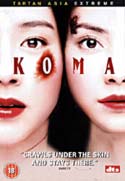
Drunk at a friend's wedding, Ching (Angelica Lee, of THE EYE) stumbles back to her room and finds - of all things - a woman in an ice-bath whose kidney has been removed by an inexperienced surgeon. Ill at the police station, it transpires that Ching is a sufferer of renal failure and needs a kidney replacement in order to live a normal life with her boring doctor boyfriend. Ching isn't under suspicion, but suspects that the shifty Wai - whom she spotted in the hotel after the wedding - is not only in league with the organ thief, but setting her up for a nasty demise. After Ching is abducted, she tells the mad abductor doc that her kidney is no good. Our heroine is spared, but the baddie beats his partner, in fact Wai, brutally. Awakening together, the two women forge an uneasy friendship, but must face a terror beyond imagining together.
In a bold performance, the attractive Angelica Lee again delves into Eastern (this time Hong Kong) body-horror, but, as with the overblown THE EYE, the overall results are severely compromised. If THE EYE's insidiously personal high concept (a woman who sees someone else's face in the mirror after an operation to restore her sight) was wasted on pointless spectacle of disaster movie proportions, KOMA similarly misfires. Having a seriously ill protagonist is a bold move for any filmmaker, but the extent of Ching's sickness isn't understood until we are well into the film: by this time several unpleasant outbursts and a dizzy drunk scene have done little to make us engage with Ching. Pallid and sickly-looking, Lee's performance is committed and convincing, but she is surrounded by bland supporting players (the intimate scenes with her boyfriend are astonishingly lacking in emotional impact) and - until the end - that losing combination of insipid camerawork and a grating score.
Although Lee can be a charismatic and intense performer, and deserves credit for avoiding a conventionally attractive role (midway through the film she sobs about being too thin, on account of her illness; a strike against western cinema's longstanding depiction of perfect female bodies), the narrative isn't up to much and wastes the leading lady's talents. The first half of the film in particular includes a very tiresome game of cat and mouse in which Wai seems to be stalking Ching after a series of 'coincidental' meetings. However, Wai's sly hints of what she is planning curiously lack conviction. If Wai is so bored by the idea, why bother in the first place? With its hellish, hallucinatory climax and ideas of organ theft, the film apes Kei Fujiwara's superior ORGAN, a similarly themed Japanese horror that matched the 'division of the body' theme with a fragmentary, avant-garde narrative and some disgustingly surreal images. KOMA goes a much safer route, a commercial film unwilling to take too many risks.
Director Law Chi-Leung talks about what he aimed to do, what he likes about the finished product and what he wished he'd done differently, but this subtitled audio commentary needs to be viewed after having the film for obvious reasons. The making of documentary looks like it's come from the marketing department, something to encourage us to watch the film, as opposed to something to really give people who have seen it some insight.
Review by Matthew Sanderson
| Released by Tartan |
| Region 2 PAL |
| Rated 18 |
| Extras : see main review |